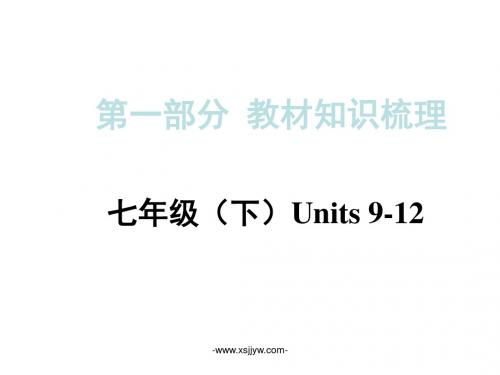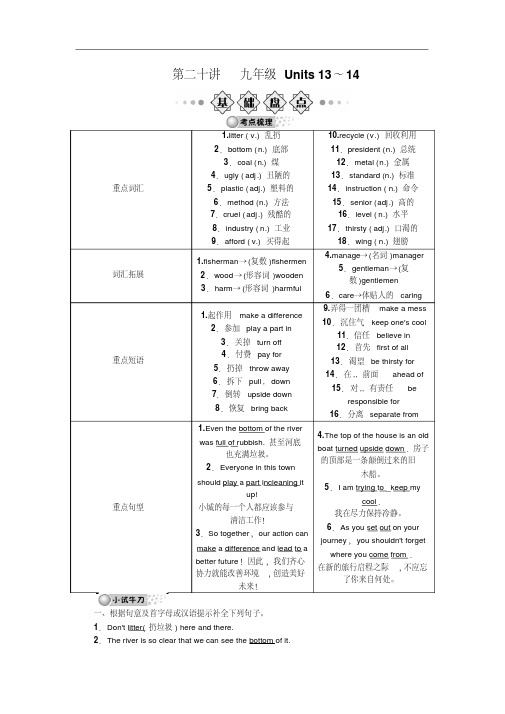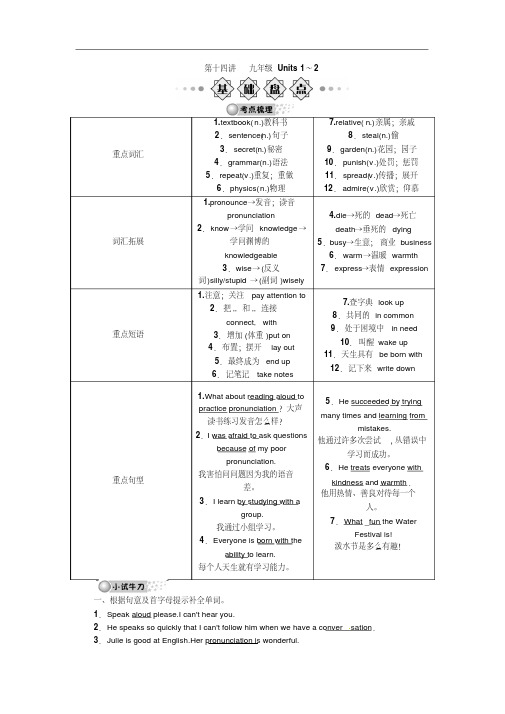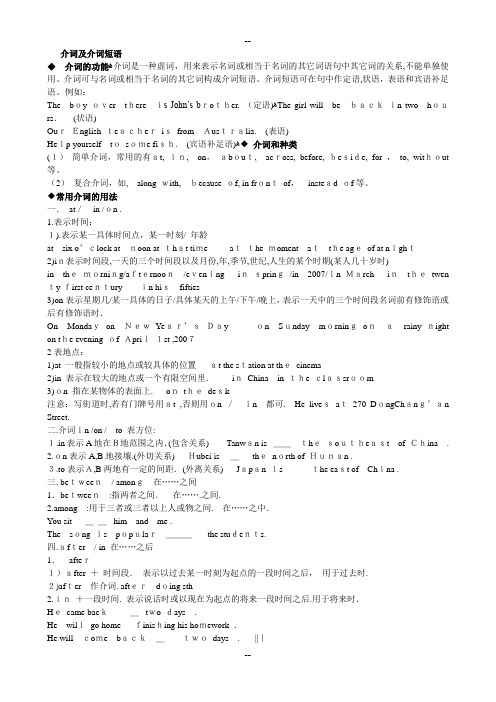《中考面对面》2015年度中考英语深刻复习配套教案整编-收集五介词和介词短语(共29张)
【贵州2015中考面对面】课标版英语第一部分教材知识梳理课件:七

-
“What + be+主语+like?”句型的主语是人时, 则是提问人的性格或内在的东西; “What +do/does + sb. +look like?”句型则只用来提问人的外表。如: —What is your friend like? 你的朋友怎么样? —He is outgoing. 他性格外向。
There is a little wine left in the bottle. 瓶子里
还剩一点酒。 has few friends. 他几乎没有朋友。 He has a few friends. 他有一些朋友。
-
考点三 I’d like some noodles. 我想要一些面条。 (Unit 10 P55)
-
肯定意义
否定意义
所跟名词 可数名词复数 不可数名词
a few一些,几个 few几乎没有 a little一点 little几乎没有
-
如:There is little wine left in the bottle. 瓶子 里几乎没酒了。
-
◆would like没有人称和数的变化。变为一般
疑问句时,直接把情态动词would提前,Would you like/love...? 比 Do you want...? 语气委婉,常用 于口语中。其肯定回答一般为Yes, I’d like/love to. 还可以是Yes, please./All right./OK.等,否定回答则 用Sorry。如: —Would you like to clean up the City Park?
hold your opinion, but you have to obey orders. 你
2015年全国中考英语试题汇编-介词

2015年全国中考英语试题汇编-介词1. 【2015年江苏省苏州市中考】In cold winter, the temperature in Harbin often remains ________ zero all day.A. aboveB. belowC. overD. under【答案】B【解析】句意:在寒冷的冬天,哈尔滨的气温通常全天都保持在零度以下。
故A,C错。
Below指地位低下或低于某水平、标准;under则指空间位置。
本题指低于零度线这个标准,故选B。
2. 【2015年云南省中考】The Third China-South Asia EXPO was held in Kunming _________ June 12th to June 16th.A. onB. inC. atD. from【答案】D【解析】句意:第三届中国南亚博览会6月12日至6月16日在昆明举行。
从……到……:from … to …,既可以指时间,也可以指地点等等。
故选D。
3. 【2015年安徽省初中毕业学业考试】The Dragon Boat Festival this year will come ______ four days.A. afterB. forC. duringD. in【答案】D【解析】句意:四天后就是今年的龙舟节了。
in+一段时间,多久以后,表示将来的时间;after+一段时间,表示过去的一段时间后,用于过去时态;在……期间;for+一段时间,达……时间。
根据句子是将来时态,故选D。
4. 【2015年广东省中考】Could you please give me a hand? I can’t complete the task on time ______ your help.A. withoutB. underC. withD. for【答案】A【解析】句意:你能帮助我吗?没有你的帮助我不能完成这项任务。
【解析版】【中考全景透视】2015中考英语人教版一轮复习导学案+第二十讲+九年级Units+13~14

第二十讲九年级Units 13~14重点词汇1.litter (v.) 乱扔2.bottom (n.) 底部3.coal (n.) 煤4.ugly (adj.) 丑陋的5.plastic (adj.) 塑料的6.method (n.) 方法7.cruel (adj.) 残酷的8.industry (n.) 工业9.afford (v.) 买得起10.recycle (v.) 回收利用11.president (n.) 总统12.metal (n.) 金属13.standard (n.) 标准14.instruction (n.) 命令15.senior (adj.) 高的16.level (n.) 水平17.thirsty (adj.) 口渴的18.wing (n.) 翅膀词汇拓展1.fisherman→(复数)fishermen2.wood→(形容词)wooden3.harm→(形容词)harmful4.manage→(名词)manager5.gentleman→(复数)gentlemen6.care→体贴人的caring重点短语1.起作用make a difference2.参加play a part in3.关掉turn off4.付费pay for5.扔掉throw away6.拆下pull,down7.倒转upside down8.恢复bring back9.弄得一团糟make a mess10.沉住气keep one's cool11.信任believe in12.首先first of all13.渴望be thirsty for14.在,,前面ahead of15.对,,有责任beresponsible for16.分离separate from重点句型1.Even the bottom of the riverwas full of rubbish.甚至河底也充满垃圾。
2.Everyone in this townshould play a part incleaning itup!小城的每一个人都应该参与清洁工作!3.So together,our action canmake a difference and lead to abetter future!因此,我们齐心协力就能改善环境,创造美好未来!4.The top of the house is an oldboat turned upside down.房子的顶部是一条颠倒过来的旧木船。
《中考面对面》2015年中考英语复习配套课件:专题五介词和介词短语(共29张PPT) (35)

+动词原形
+其他
things.把你的东西 window. 不 要 打 开 收起来放好。
祈使句句式
肯定形式
否定形式
Let+ 宾 语 + Let’s
have Don’t let him go
他独自去那儿。 No photos! 禁止照
数+主+谓!根据此处形容词 excellent可知选A。
3. —_____! Or we will be late for school
again.
—Sorry, my feet got hurt.
A. Coming on
B. Come on
C. To come on
D. Came on
【解析】考查祈使句的用法。句意“______!要
Literature. _____ excellent he is!
A. How
B. What
C. What a
D. What an
【解析】考查感叹句的用法。句意:莫言获得了
诺贝尔文学奖,他多优秀啊!感叹句的基本结构为 :How+adj.+主+谓!或What+a/an+adj.+可数名词
单数+主+谓!或What+adj.+不可数名词或名词复
B. So has he
C. So he have
D. So he has
【解析】考查倒装句。句意“彼得最近在数学方
面取得了很大的进步。”“______。他最近学习很 用功。”so+主语+助动词/情态动词/系动词,表示 “„„确实如此”,助动词应该与主句时态保持一 致,主句为has made,故选D。
【解析版】【中考全景透视】2015中考英语人教版一轮复习导学案+第十四讲+九年级Units+1~2

第十四讲九年级Units1~2重点词汇1.textbook(n.)教科书2.sentence(n.)句子3.secret(n.)秘密4.grammar(n.)语法5.repeat(v.)重复;重做6.physics(n.)物理7.relative(n.)亲属;亲戚8.steal(n.)偷9.garden(n.)花园;园子10.punish(v.)处罚;惩罚11.spread(v.)传播;展开12.admire(v.)欣赏;仰慕词汇拓展1.pronounce→发音;读音pronunciation2.know→学问knowledge→学问渊博的knowledgeable3.wise→(反义词)silly/stupid→(副词)wisely4.die→死的dead→死亡death→垂死的dying5.busy→生意;商业business6.warm→温暖warmth7.express→表情expression重点短语1.注意;关注pay attention to2.把,,和,,连接connect,with3.增加(体重)put on4.布置;摆开lay out5.最终成为end up6.记笔记take notes7.查字典look up8.共同的in common9.处于困境中in need10.叫醒wake up11.天生具有be born with12.记下来write down重点句型1.What about reading aloud topractice pronunciation?大声读书练习发音怎么样?2.I was afraid to ask questionsbecause of my poorpronunciation.我害怕问问题因为我的语音差。
3.I learn by studying with agroup.我通过小组学习。
4.Everyone is born with theability to learn.每个人天生就有学习能力。
中考复习介词及介词短语

介词及介词短语◆介词的功能ﻫ介词是一种虚词,用来表示名词或相当于名词的其它词语句中其它词的关系,不能单独使用。
介词可与名词或相当于名词的其它词构成介词短语。
介词短语可在句中作定语,状语,表语和宾语补足语。
例如:The boy over thereis John’s brother. (定语)ﻫThe girl will bebackin two hours.(状语)OurEnglish teacherisfromAustralia.(表语)Help yourself tosome fish. (宾语补足语)ﻫ◆介词和种类(1)简单介词,常用的有at, in,on,about,across, before, beside, for ,to, without 等。
(2)复合介词,如,along with,because of, in frontof,instead of等。
◆常用介词的用法一.at/in /on .1.表示时间:1).表示某一具体时间点,某一时刻/ 年龄at six o’clock atnoon at that time atthe moment atthe ageof at night2)in表示时间段,一天的三个时间段以及月份,年,季节,世纪,人生的某个时期(某人几十岁时)in themorning/afternoon/evening inspring/in2007/in March inthetwen ty-first centuryin hisfifties3)on表示星期几/某一具体的日子/具体某天的上午/下午/晚上,表示一天中的三个时间段名词前有修饰语或后有修饰语时.On MondayonNewYear’sDay on Sunday morningonarainy night on the evening of April1st ,20072表地点:1)at 一般指较小的地点或较具体的位置at the station at thecinema2)in 表示在较大的地点或一个有限空间里.inChina in the classroom3)on 指在某物体的表面上. onthedesk注意:写街道时,若有门牌号用at ,否则用on /in都可. He livesat270 DongChang’an Street.二.介词in /on /to 表方位:1.in表示A地在B地范围之内.(包含关系)Tanwan is ____ thesoutheast of China.2.on表示A,B地接壤.(外切关系)Hubei is ____thenorth of Hunan .3.to表示A,B两地有一定的间距.(外离关系) Japan is _____ the east of China .三. between/ among在……之间1.between:指两者之间.在…….之间.2.among:用于三者或三者以上人或物之间.在……之中.You sit_____ him and me .The song is popular______ the students.四.after/ in 在……之后1.after1)after +时间段.表示以过去某一时刻为起点的一段时间之后,用于过去时.2)after作介词. afterdoing sth2.in+一段时间. 表示说话时或以现在为起点的将来一段时间之后.用于将来时.Hecame back______ two days.He willgo home___finishing his homework .He willcome back_____ twodays. |||五.with / in/ by 表示“用……”1.with 表示“用…”一般指有形的工具/ 手段/人体器官.He cut the apple into halves____ a knife .注:with表伴随, “带有,含有”He came in _____ abig smileon his face .2.in表示用某种语言,方式,途径. 或书写/绘画所用的材料.也可表交通方式.Can you say it _____English?He wrote aletter ____blue ink.3.by表示乘坐交通工具, 表示方式,方法I study for a test_____ working with a group .He makes a living____selling newspapers .注意: 同义词组1).byphone= on the phone2).bycar= in a car3).in pen= with a pen=with pens六.across / through/over/ by 经过1.across 指横穿,穿过.表示动作从某一物体表面上经过.2.through 指穿过,透过,表示从某一物体空间内通过.3.over表示从某人或某物的上空经过或越过,不与表面接触.4.by表示从某人/某物的旁边经过.Can you swim ______the river ?theelephant is sobigthatit can’t go_____ thegate .I don’tthink anyone can jump ___the fence.Iwalked _____ the bank of Chinayesterday. |||七.in front of/ in the front of1.in the frontof表示在…….内部的前面2.in frontof表示在……外面的前面There is a deskin_____ front of our classroom .There isabigtree in _____ frontofour classroom.八.其它介词的用法:1.at的其它用法.1).表示“从事或正在做某事”,其后加的名词往往不加冠词.She is atwork now =Sheis working now.2)at表示“价格或速度”Thetrain ranat120kilometres an hour .2.in的其它用法:1)in表示“在……方面”词组:dowell in=be good at be weak in2)in 表示“穿着”后接表颜色的词或衣服.词组: be in+衣服=be wearing +衣服3)in作副词, “在家”= at home3.like的用法:1).像/和……一样. 常与系动词连用.词组: look like soundlike2).与what 连用, “是什么样子,怎样”.Whatis he like? Heis kind .4.off的用法:1).从……下来,脱离某物体.词组: fall off2).“休假”通常放在时间名词之后.词组:have+时间+ offHe hasn’t had a nightofffortwohours .5.except /besides1).except除了…….之外,都……. . 不包括在范围之内.注: nothing but …除了……之外,什么也没有.2).besdies除了……之外,还有…….包括在范围之内.Weallwentswimming ______ Lucy.Thereis _______a letterinthebox.We study Japanese and French____English.6.with/without1).with具有,含有-----反义词: without 没有词组:with thehelpof =withone’shelp =because of =thanks towithoutone’s help2).without的用法:A).without +sb./sth. 没有某人或某物B).without+doing sth.He lefthere without____(say)“Goodbye”tousC).without sth 常与if引导的否定的条件句.Ifthereis nowater , we can’tlive.=We can’t live ______ _______ . |||7.onthe tree/in the treeon the tree表示“树上本身长的东西”在树上. 而in thetree 表示“外界的物体进入树中”人或物在树上.Thereare someapples _____ thetree .Thereis a boy ____the tree.8.since / for注: since/ for用于现在完成时.1).since :a).since +时间点b).现在完成时+since +一般过去时c).since +一段时间+ ago.2)for:for +一段时间= since +一段时间+ago9.be made+介词的区别:bemade of 由…制成(看得见原材料)be made from由…制成(看不见原材料)be made in +地点由哪儿生产be made by sb.由某人制造10.表示“数量的介词”about , round around over1).about , roundaround表示“大约……”2).over 表示“超过”= morethan.11.inside /outsideInside在……里面------反义词:outside在….外面12.in the wall/onthewallin the wall 表示“门窗在墙上”onthe wall 表示“某东西张贴或挂在墙上”九.不用介词的情况:1).当时间状为:tonight, today,yesterday, tomorrow 等时,不用介词.What are you going to dotonight ?2).含有this, that, these, those,last, next, every, each等时间状语.Hewent toWuhan last week .3).以all开头的时间状语前面不用介词.He hasworked allday .4).以some ,any, one 等构成的时间状语前不用介词.◆介词短语介词和动词、形容词或名词相结合后,形成复合词,有特定的意思。
【贵州2015中考面对面】人教版英语第一部分 教材知识梳理 课件:七

如: A car parked in front of the house.一辆车停在 房子前面。
He is sitting in the front of the car with the
driver.他与司机一起坐在汽车前部。
-
现学现用
-
第一部分 教材知识梳理
七年级(下) Units 5-8
-
考点精析
考点一 We must save the trees and not buy things made of ivory. 我们必须拯救树木,拒绝购买象牙
制品。( Unit 5 P29 )
【用法归纳】be made 短语的用法
Wine is made from grapes.这种酒是由葡萄酿成的。 ◆材料+be made into+成品(„„被制成„„)
-
如:The grapes are made into wine.这些葡萄被制
成了酒。 ◆be made up of由„„组成。如: Our class is made up of six groups. 我们班是 由6个小组组成的。
-
现学现用
-
考点三 The pay phone is in front of the library. 付费 电话在这个图书馆的前面。(Unit 8 P44)
【用法归纳】辨析in front of 与in the front of
-
吗?
He has two daughters. One is a nurse, and the other is a worker. 他有两个女儿,一个是护士,另 一个是工人。 Some of us like singing and dancing; others like playing sports. 我们中的一些人喜欢唱歌和跳舞, 另一些人喜欢从事体育活动。
《中考面对面》2015年中考英语复习配套课件:专题五介词和介(精)

第二部分语法专题突破专题十六情景交际1 •观点(考查3次)(1)询问观点句型:What do you think of・・・?你认为. 怎么样?(加下划线句型均为近4年云南中考所涉及到的句型)How was・・・? 怎么样?Do you think・・・?你认为吗?Are vou confident in・・・?你对有信心吗?When I was young・・•当我年轻时.・・・is bad for your ey£S・对你的眼睛有害。
We should…我们应该...Are you sure...?你确定... 吗?I have nevei•…我从没有..Fm learning…我在学习...Tht most unforgettable・・・is最难忘的是Have you heard・・・?你听说过吗?Did you get・・・?你有. 吗?(2)应答语:I love them.我喜欢它们。
I cnn't stand them.我忍受不了它们。
Me, too•我也一样。
It was great!它太棒了 !Yts, I think so.是的,我认为是这样的。
Sure, I am.当然,我是。
So did I•我也是。
So am I•我也是。
That sounds exciting.那听起来很令人兴奋。
Well done•干得好。
Thty are wonderful.它们太完美了。
2•请求(考查4次)(1)请求句型:Can/Could/May L・・?我可不可以. ?Can/Will you please...?你能... 吗?Would you mind (not) ・・・?你介意/不介意.. ?I wonder if I could/can・・•我想知道我能否. Would you phase...?你能 ... 吗?(2)肯定答语:Yes./Sure./Of course./Yes, I will.当然可以。
- 1、下载文档前请自行甄别文档内容的完整性,平台不提供额外的编辑、内容补充、找答案等附加服务。
- 2、"仅部分预览"的文档,不可在线预览部分如存在完整性等问题,可反馈申请退款(可完整预览的文档不适用该条件!)。
- 3、如文档侵犯您的权益,请联系客服反馈,我们会尽快为您处理(人工客服工作时间:9:00-18:30)。
注意: (1)某国人变复数: 中(Chinese) ,日(Japanese)不变, 英( Englishman→ Englishmen ), 法 ( Frenchman→ Frenchmen ) 变,其余在 后面加-s。 (2)我们可记为:黑人英雄(hero)爱吃西 红柿(tomato)和土豆(potato)。
考点二 名词的数(考查8次) 1. 可数名词复数
可数名词分为单数和复数两种形式:表 示单一概念时用单数形式,并用a或an修饰; 表示两个或两个以上的概念时用复数形式。 名词的复数形式可分为规则变化和不规则变 化。
(1)可数名词复数的规则变化:
情况 构成方法
例词
一般情况
加-s
cake →cakes bed →beds
考点四 名词作定语(考查3次) 名词作定语一般用单数,如:orange juice, family tree等,但也有以下例外: 1. 名词复数作定语 sports meeting运动会; students reading-room学生阅 览室; talks table谈判桌
注意:man(男人),woman(女人),gentleman (绅士)等作定语时,其单复数由所修饰的名词的 单复数而定。men workers男工人; women teachers 女教师。
3. The people in western countries celebrate ______by making pumpkin lanterns and wearing special costumes with masks.
A. Christmas B. Halloween C. Thanksgiving Day D. New Year’s Day
以辅音字母+y 结尾的词
先变y为i, 再加-es
baby→ babies city→ cities
以元音字母+
toy→ toys
加-s
y结尾的词
monkey→ monkeys
以辅音字母 +o结尾的词
若表示有生 命的加-es
若表示无生 命的加-s
potato→ potatoes tomato→ tomatoes
概念 population 人口 knowledge 知识
可数名词与不可数名词运用口诀 可数不可数好分辨,名词所示物分两半。 如每半不能叫原名,那该词可数最公平。 每半还能把原名叫,不可数名词就遇到。 有的名词是两面堵,意变不可数为可数。
如: bike(自行车),如果把一辆自行车分成两半, 每半只能叫自行车的一部分,不能再叫自行车, 所以bike是可数名词。 orange(橘汁),如果把一瓶橘汁分成两瓶, 每瓶还可以叫橘汁,故orange(橘汁)为不可 数名词;但意为“橘子”时,是可数名词。
考点三 名词所有格(考查2次) 名词的所有格表示名词与名词之间的所属关
系。常见的有’s所有格, of 所有格和双重所有格 三种形式。
1. ’s所有格 类别
方法
举例
有生命的 单数名词
加’s
my son’s pen我 儿子的钢笔
有生命的 复数名词
以s结尾加 ’ 不以s结尾 加’s
the teacher’s office老师办公室
(3)巧记以f/ fe结尾,f/ fe为v,再加-es的词: 半(half)片树叶(leaf)自己(self)黄, 妻子(wife) 拿刀(knife)去杀狼(wolf), 架(shelf)后小偷(thief)逃命(life)忙。
(4)单复数同形的单词 口诀:中国人(Chinese)和日本人(Japanese) 很爱护鱼(fish)、鹿(deer)和绵羊(sheep)。
第二部分 语法专题突破
专题一 名 词
考点精析
考点一 名词词义辨析
1.语境辨析(考查11次) 名词辨析侧重于对语境辨析的考查,即考查同
类单词的意思在语境中的用法。如食物类、职业类、 身份类、交通工具类、实物类等。我们渴了就需要 水(water),饮料(tea, coffee, juice等),饿了就 需要食物(bread, rice, meat, cake等),我们寄信 需要去post office, 取钱需要去bank。
(5)辨析hurt, injure, harm与wound详见八年级 (下) Units 1-2 3. 常识及专有名词辨析(考查1次)
常识辨析和专用名词辨析主要是国名、节 目和电台类,如:Canada, Japanese, English, Australia(2012昆明23题考查), Chinese, Russian, American, Australian; Children’s Day, Women’s Day, the Spring Festival, National Day; UN, NBA, CCTV, BBC等。
【解析】考查名词词义辨析。句意:在西方 国家,人们通过制作南瓜灯和穿戏服、戴面 具来庆祝____。A. 圣诞节;B. 万圣节;C. 感恩节;D.新年。根据常识,应该是万圣节。 故选B。
4. —Can you give me____? I want to write something. —Sure, here your are.
以字母s, x, sh, ch等 结尾的词
加-es
bus →buses box →boxes watch →watches dish →dishes
以字母f, fe 结尾的词
变f, fe为v 再加-es
直接加-s
leaf →leaves knife →knives
belief →beliefs chief →chiefs
注意:不可数名词量化的表示 ◆不可数名词表示数量的多少时,必须与表示数 量的名词连用,即“数词+表示计量的名词(可 数名词)+of+不可数名词”。常见的计量名词有: bottle, cup, bowl, glass, plate, pair, drop, piece等。 如:a cup of tea/coffee一杯茶/咖啡, five drops of water五滴水。 ◆修饰不可数名词要用much, a little, little, a lot of, lots of等词。
2. 不可数名词 (1)不可数名词通常没有复数形式,也不能用a 或an修饰。常用的不可数名词主要如下表:
物质 液体 milk 牛奶 water 水 wine 酒 oil 油
名词 自然物质 soil 土壤 sand 沙子 wood 木头
情感 joy 高兴 friendship 友情
抽象 名词
学科
math 数学 geography 地理 physics 物理 chemistry 化学
(4)辨析job与work ①job是可数名词,指一项具体的工作,多指 “零工”或“短工”。如: I do get a job in a travel agency. 我真的在旅行 社找了份工作。 ②work是不可数名词,指需要花体力和脑力 来完成的工作。如: He succeeded because of his hard work. 由于 他的努力工作,他取得了成功.
C. map
D. notebook
【解析】考查名词词义辨析。句意:李第 一次到南昌。或许他需要一张__来观光。 watch 手 表 ; ticket 票 ; map 地 图 ; notebook笔记簿。结合选项意思可知C项 正确。故选C。
2. Jim, look! There are a group of ____
3. 双重所有格 双重所有格主要表示整体中的一部分,有两
种形式: (1) of +名词所有格。如:a photo of my brother’s (我弟弟的一张照片) (2) of +名词性物主代词。如:a new friend of mine(我的一个新朋友) 注意:双重所有格和一般所有格意义不同。如: a photo of Mary’s(照片属于玛丽,但照片上的人 不一定是玛丽);a photo of Mary(照片上的人 是玛丽本人)。
2.数词+名词作定语(考查2次) a five-year plan一个五年计划; a seven-year-old child一个七岁的孩子
现学现用
1. Lee is new in Nanchang. Maybe he
needs a _____ for sightseeing.
A. watch
B. ticket
表示时间、距 单数
an hour’s walk步行1个小时
离、国家等的 加’s
two days’ work两天的工作
名词
复数加’
在最后一
表示几个人共
Mike and John’s desk
个名词后
同拥
Mike’s and John’s desks麦
词后
自拥有
photo→ photos piano→ pianos
以元音字母+
加-s
o结尾的词
radio→ radios zoo→ zoos
(2)可数名词的不规则变化: ①改a为e型。如:man→ men, woman→ women, Frenchman→ Frenchmen, policeman→ policemen ②改oo为ee型。如:foot→ feet, tooth→ teeth ③特殊变形。如:child→ children, mouse→ mice
2. 近义辨析 近义词辨析考查出现频率较高的主要包括:
(1)noise, sound与voice 详见九年级(全) Units 7-8 (2)family, home, house与room 详见七年级 (上)Units 1-4 (含starter)
